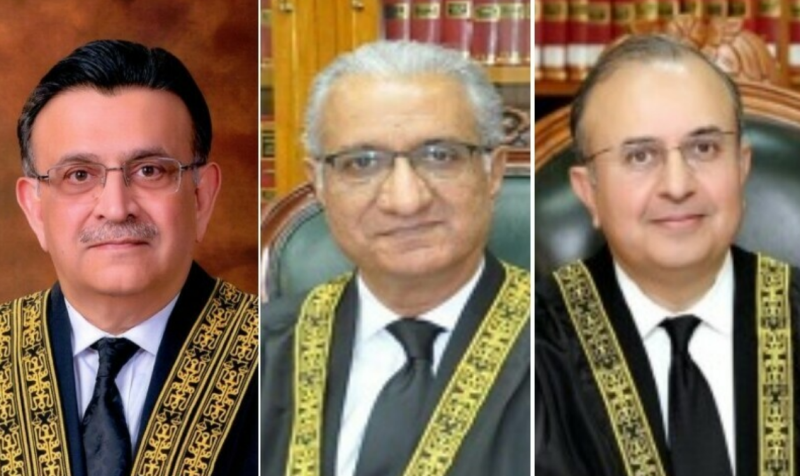Islamabad (Web Desk): Islamabad (Web Desk): The Supreme Court (SC) on Friday announced the verdict on Pakisan Tehreek-e-Insaf (PTI) Chairman and former premier Imran Khan's petition challenging the National Accountability (Amendment) Act, 2022.
The reserved verdict was announced by three-member bench headed by Chief Justice of Pakistan (CJP) Umar Ata Bandial, and comprising Justice Ijazul Ahsan and Justice Syed Mansoor Ali Shah.
In a 2-1 majority verdict, the top ordered to restore the corruption cases against public office holders that were withdrawn after amendments were made to the country’s accountability laws.
CJP Bandial and Justice Ahsan declared Khan's plea to be maintainable while Justice Shah disagreed with the majority verdict.
In its ruling, the Supreme Court has struck down some sections of the amendments in the National Accountability Ordinance 1999.
These included one which limited the National Accountability Bureau’s (NAB) jurisdiction to cases involving over Rs500 million and one which allowed the accused to claim the amount of plea bargain deposited after being acquitted.
The top court directed that the cases that were withdrawn after NAB’s jurisdiction was limited to investigating cases below Rs500m be fixed for hearing in accountability courts.
The court also annulled the verdicts issued by the accountability courts in light of the amendments made to the laws.
It directed that the cases withdrawn as a result of the amendments be fixed for hearing in accountability courts within a week.
The SC further directed the NAB to send the records to the relevant courts within seven days.
he top court had wrapped up the hearing on the plea and on September 5.
In his remarks while reserving the verdict in the last hearing, CJP Umar Ata Bandial had said that a "short and sweet order" would be issued soon.
In June 2022, PTI Chairman and former premier Imran Khan had moved the SC against the amendments to National Accountability Ordinance (NAO) by the then Pakistan Democratic Movement (PDM)-led coalition government.
In his petition, theformer premier had claimed that the amendments to the NAB law had been made to benefit the influential accused persons and legitimise corruption.
The federal government was represented by Makhdoom Ali Khan, while Imran Khan was represented by Khawaja Haris.
The NAB (Second Amendment) Bill 2021 reduced the four-year term of the NAB chairman and the bureau's prosecutor general to three years.
After approval of the law, NAB was not be able to act on federal, provincial or local tax matters. Moreover, the regulatory bodies functioning in the country have also been placed out of NAB's domain.
As per the bill "all pending inquiries, investigations, trials or proceedings under this ordinance, relating to persons or transactions, shall stand transferred to the concerned authorities, departments and courts under the respective laws."
It set a three-year term for the judges of the accountability courts. It also made it binding upon the courts to decide a case within one year. Under the proposed law, it had been made binding upon anti-graft body to ensure the availability of evidence against an accused prior to his or her arrest.
According to one of the key amendments, the act "shall be deemed to have taken effect on and from the commencement of the National Accountability Ordinance 1999."


